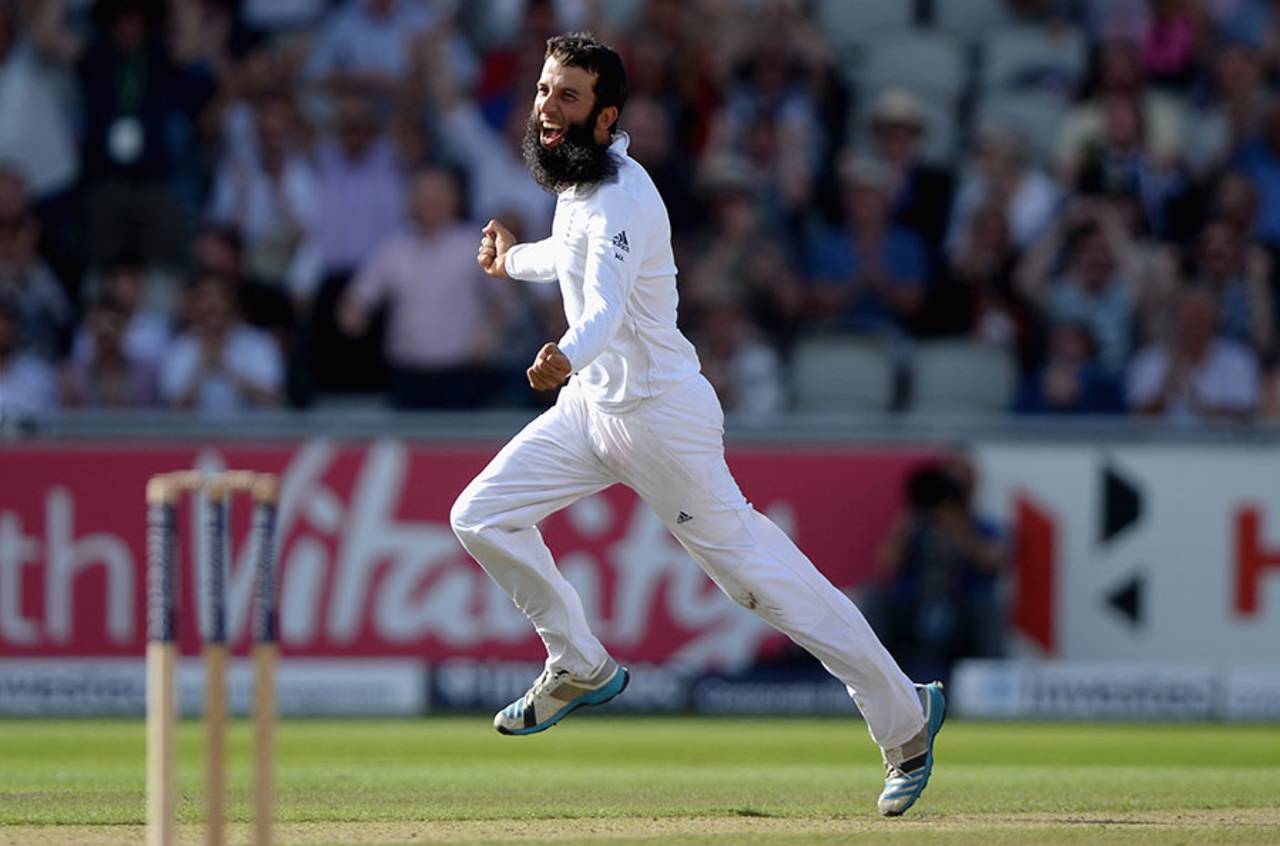Moeen Ali: England's man of the summer
He has won respect with his cricket doing the talking, not letting himself be crushed by shameful boos from fans
Kamran Abbasi
09-Sep-2014

Moeen Ali is a confident Englishman and a confident Muslim, determined to show that the two are reconcilable • Getty Images
In September, when the end-of-season gloom sets in, English cricket begins its anguish over a difficult winter to come. After all, it has been a mixed summer. The dominant narrative is the flaws in the one-day team at the expense of some outstanding Test performances against India. English cricket is lost, you might think?
Perhaps it is wrong to be so gloomy? The development of Joe Root and Gary Ballance is important for England's future. Progress isn't always best judged by results alone, though. Indeed, cricket is a greater story than that told by any scorecard, and in that sense the man of England's summer has been Moeen Ali.
His beard brought instant suspicion. A beard of such length and luxuriance always does, despite the best efforts of Hashim Amla to create a positive image for Islamic facial hair. It also invited questions about loyalty and purpose. And Moeen fell into a trap. He said that he was representing the Muslim faith - presumably in all innocence - but the journalists and commentators of the world are ready to pounce on any unqualified statement. They did. In our age of 140-character sound bites, context is nothing. Subsequent events have confirmed that Moeen's loyalty lies firmly with England. He does represent the Muslim faith too, but as an English Muslim of Pakistani heritage, and positive role models of that genre are to be embraced.
Moeen was not to be deterred. He is confident in his Englishness, as befits a man who was born in Birmingham and developed his cricketing skills in the English system, unlike some other players representing his country. His next move was to support the Palestinians in Gaza. A reckless gesture, some might say. How ill-judged to introduce politics into cricket. But cricket and politics are inseparable, although in this case Moeen might argue that his actions were humanitarian rather than political, which is exactly the defence the ECB offered. Moeen, then, is a confident Englishman and a confident Muslim, determined to show that the two are reconcilable, an ambition that deserves wide support.
Moeen's loyalty lies firmly with England. He does represent the Muslim faith too, but as an English Muslim of Pakistani heritage, and positive role models of that genre are to be embraced
Alongside these dramas, Moeen's runs and especially his wickets helped England win international matches. If you choose to make a statement with a beard or a wristband, you need the substance of international runs and wickets to protect you from any backlash. Success tends to bring greater support from your countrymen and earns respect from your opponents.
Instead, it has brought Moeen boos and catcalls from fellow Englishmen who are supporting India. A man of statements does not expect to be loved by everybody. Indeed, Moeen would fully understand the reasons why Asians in England continue to support India and Pakistan. That is their right. But abusing an opposition player for no other reason than his heritage, his religion, or both, contravenes any code of fan behaviour and has brought shame upon Indian fans in England.
Moeen is unlikely to be crushed by these antics but the onus is on the ICC to find solutions. The football world has had to reluctantly agree that abuse of players based on colour, creed or religion is unacceptable, and referees are entitled to stop play when such incidents occur. Police prosecutions may follow. The ICC must take an equally serious view of supporters' behaviour. Any professional sport demands the highest standards from players and fans. Televised coverage increases the scrutiny further and makes unpalatable viewing when fans target one player based on his identity.
This English summer began with doubts about Moeen's ability and questions about his loyalty, criticisms that he has hit for six. It ends with him establishing himself as an essential player in England's new era, devoted to the cause and his country, but a victim of unprecedented abuse from fans with divided loyalties. A rare player thrives in such a maelstrom and Moeen is successfully using cricket to challenge harmful stereotypes. In one summer of mixed fortunes, for reasons of cricket and much beyond, Moeen Ali has become the most important player in English cricket.
Kamran Abbasi is an editor, writer and broadcaster. @KamranAbbasi